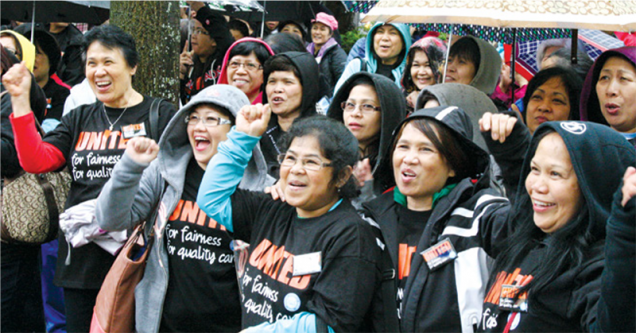Pandemic exposes need to support undocumented immigrants
Pandemic exposes need to support undocumented immigrants

(Photo: https://cupe.ca)
By Irish Mae Silvestre
The Philippine Reporter
Danilo D. was afraid to speak up. In 2009, he left Caloocan City in the Philippines and arrived in Canada as a worker for a cleaning company. However, he became an undocumented immigrant after his permanent residence application was rejected in 2017. Since then, he’s been doing cleaning jobs in apartments and construction sites – anything to pay the bills and the rent.
“There’s a lot of us [undocumented workers] here and the experience we have in common is that we’re trying to find jobs to survive and most people don’t know the struggles we face,” said Danilo.
That’s why he agreed to be part of a campaign launched by the Migrant Rights Network advocating for more government support for undocumented and migrant workers.
According to a 2007 survey by the RCMP, there’s an estimated 500,000 undocumented migrants living in Canada. Despite their large numbers and their prominent presence in essential services, they remain unrecognized and especially vulnerable during the pandemic.
“We’re calling on the federal government to ensure access to income for all migrant and undocumented people in Canada, including those without social insurance numbers or those who have invalid SIN numbers,” said Syed Hussan, coordinator for Migrant Workers Alliance for Change.
“We want income support for everyone without SIN because these are essential workers who need income support because, otherwise, they’re not able to feed their families. And there are no jobs right now.”
The organization is working to urge the government to include undocumented and migrant workers in the Canada Emergency Response Benefits (CERB). According to a statement by Migrant Rights Network, these groups are “over-represented” in essential industries like agriculture, cleaning, in long-term care facilities, grocery stores, restaurants, warehouses, domestic work and as truck drivers and delivery workers. Most pay income tax, EI and CPP.
The pandemic further puts this vulnerable population at even greater risk. With no rights or access to health care or benefits, they’re less likely to complain about unsafe work conditions.
For example, Danilo said that undocumented workers who contract COVID-19 are unlikely to seek medical attention. “He’s just going to hide because he can’t go out, right?” he said. “That’s the fear factor.”
There’s also the constant worry of being reported, which not only puts workers at risk but also the employers who could face stiff penalties.
With even more limited job prospects, survival is a constant struggle.
“Once an opportunity comes, you have to grab it – you’re like a beggar on the street asking for a penny or dime,” said Danilo. “People like me are finding ways to even get a one- or two-day job to make some money. Our situation is too hard, it’s too difficult.”
According to a 2016 census by Statistics Canada, 42.9 percent of non-permanent residents are considered low-income compared to 12.5 percent of non-immigrants, and 17.9 percent of immigrants. As such, they’re more vulnerable to economic crises.
Hussan stated that the campaign is about “raising our voices to make sure that the most marginalized and excluded people in our communities don’t die out of hunger.”
“Each and every one of us needs to call on the government to take action,” he said.
It’s been seven years since Danilo last saw his daughters; he’s not sure when he’s going to see them again. As much as he misses his family, going back to the Philippines simply isn’t an option. At the age of 49, he believes that it’s unlikely that there would be any job prospects available to him back home.
“We didn’t want to be undocumented,” said Danilo. “It’s not our fault that we’re undocumented or that we lost our status – we did our best. We did what we had to do but, for some reason, some decisions were made [that caused us to lose our status].”
He also hopes to put an end to the stigma as more undocumented workers speak out.
“We want people to know that we’re human, we have bills to pay and family back home,” said Danilo. “We didn’t come here to take jobs away. We came here to work and make money. We’re not here to compete with them but to fill the gaps and labor needs that no Canadian want to do.”
Comments (0)